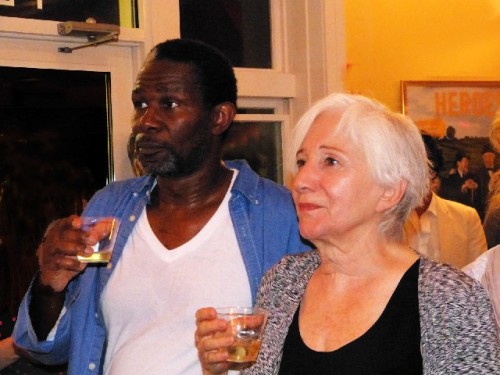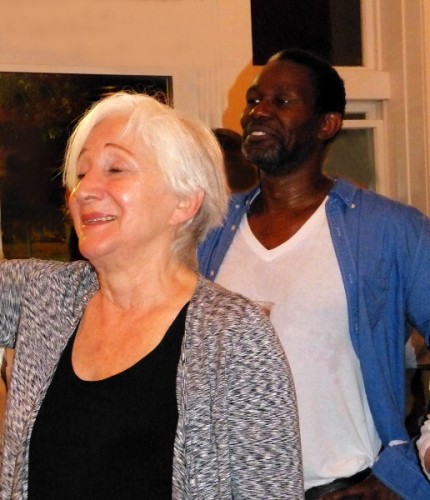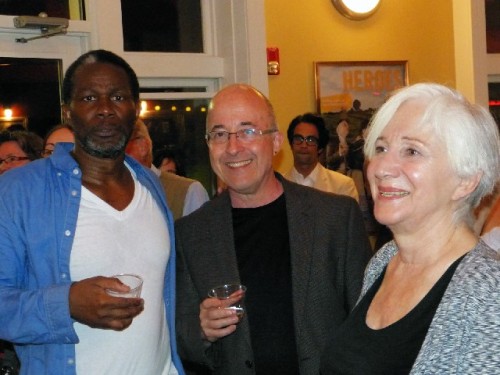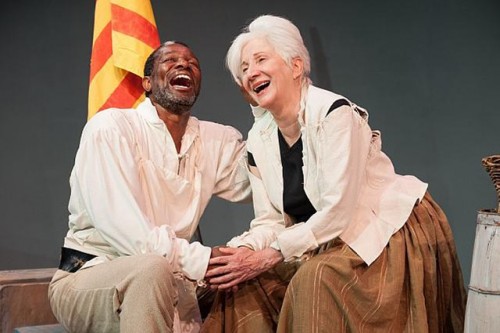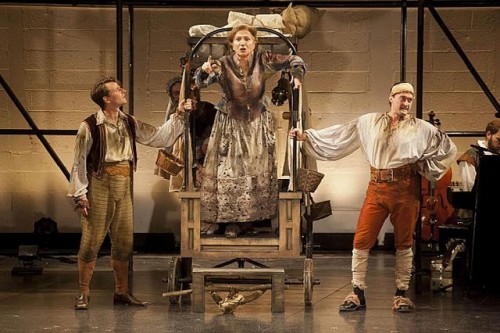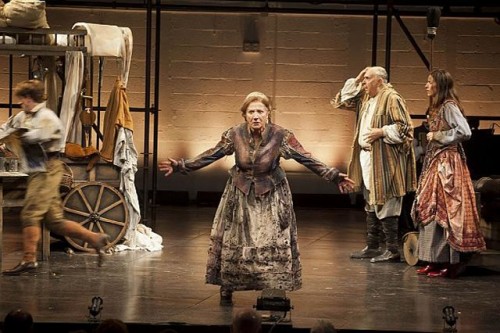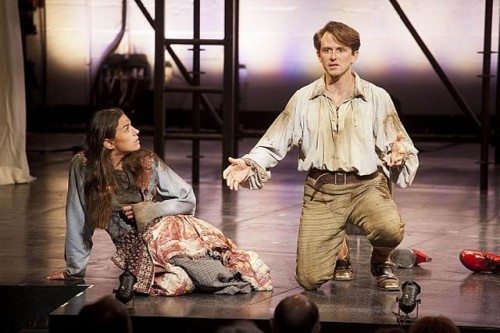Olympia Dukakis in Her Fifth Mother Courage
Powerful Brecht Epic Theatre at Shakespeare & Company
By: Charles Giuliano - Aug 03, 2013
Mother Courage and Her Children
By Bertolt Brecht
English Version by Eric Bentley
Directed by Tony Simotes
Original Music by Paul Dessau
Set, Patrick Brennan; Costumes, Arthur Oliver; Lighting Matthew E. Adelson; Additional Music, Scott Killian and Ian Sturges Milliken; Choreography, Barbara Allen; Fight Choreography, Tony Simotes; Stage Manager, Diane Healy; Assistant Stage Manager; Hope Rose Kelly; Alissa Mesibov, Dramaturge.
Cast: Mark Bedard (Recruiting Officer, First Soldier, Soldier 1, Ordnance Officer), Apollo Dukakis (The Chaplain), Olympia Dukakis (Mother Courage), Charles Sedgwick Hall (Ensemble, Sergeant, Poldy, Second Soldier, Soldier 2), Edgar Landa (Ensemble, Patch, Regimental Clerk, Lieutenant), Paula Langton (Yvette Potter), Josh Aaron McCabe (Eilif), Nafeesa Monroe (Ensemble, registrar, Young Woman, Singer, Peasant Woman), Brooke Parks (Kattrin), Renee Margret Speltz (Ensemble, Soldier, Sergeant, Guard, Young Peasant), Andy Talen (Ensemble, Young Soldier, Guard, Young Peasant), John Douglas Thompson (The Cook), Michael F. Toomey (Ensemble, Swedish Commander, Older Soldier, Peasant), Ryan Winkles (Swiss Cheese), Eric Sirakian (Soldier/ Yvette’s Servant).
Musicians: Andy Talen (banjo, keyboard, guitar), Douglas Seldin (percussion), Mark Bedard (bass), Eric Sirakian (violin, keyboard), Ryan Winkles (trombone, harmonica), Ian Sturges Milliken (piano, cello, guitar, accordion)
Shakespeare & Company
Tina Packer Playhouse
Lenox, Mass.
July 26 to August 25, 2013
With a powerful production of Bertolt Brecht’s (1898–1956) Epic Theatre, anti-war play Mother Courage and Her Children (written in 1939 first produced in 1941) artistic director Tony Simotes, the director of this production, has raised the bar not just for Shakespeare & Company but for theatre at the highest artistic level in the Berkshires.
In this unique instance it’s all about family.
Not just for the scrappy, clever, survivalist Mother Courage, played with stunning authority by Olympia Dukakis, but with Simotes and the company as an extended theatrical family.
Last year Simotes was successful in luring Dukakis, his former professor during graduate study at NYU, to the Berkshires for a gender reversal playing Prospero in Shakespeare’s complex and fantastical The Tempest.
Following the critical and artistic success of that production he inquired what she might like to do next?
The 83-year-old Academy Award (Moonstruck) winning actress said that she might have one more Mother Courage left in her. The last was 20 years ago and for S&Co this is the fifth time that she has played the wartime profiteer and Brechtian anti hero.
Horrified by the rise of the Nazi party and impending war in Europe, Brecht, a Marxist, is said to have written the play in a frenzy of sizzling rage. It was to be presented as an assault on the audience and his leading character was designed, in his Epic Theatre style, to elicit no compassion from the audience. She was a signifier of those who thrive and profit on war. So Mother Courage is his Krupp, Mercedes and Bayer who provided the armaments and Xylene gas for Hitler’s war and genocide.
While Brecht’s passionate rage still pervades the play in this production the style of Epic Theatre is less an assault than a humanistic exploration of the characters. Epic Theatre and "estrangement effect" or Verfremdungseffekt is achieved through the use of placards which reveal the events of each scene, juxtaposition, actors changing characters and costume on stage, the use of narration, simple props and scenery. A single tree conveys a whole forest. The stage is usually flooded with bright white light whatever the scene. Several songs underscore the themes of the play.
Under the direction of Simotes, in a more contemporary interpretation of Brecht, we feel compassion for the profiteer Mother Courage. She does what is necessary to prevail under the most horrific circumstances. Including denying that the dead soldier is her son the beloved and charming, innocent youth Swiss Cheese played with typical whimsy by the versatile and always fascinating Ryan Winkles. To admit that he was her son would involve risk and possible execution as a collaborator. He was the alleged thief of the company cash box.
Credit Simotes for finding dark humor in Brecht. Through a long grim evening, three hours of running time with intermission in two acts, we appreciated moments of comic relief.
Brecht can be relentless on mind and body. The Tina Packer Playhouse is devilishly uncomfortable with its bench seating particularly during a long evening of intensive drama.
The company generally favors bare pipe sets (Patrick Brennan) and few distractions from an intensive focus on the actors and their finely tuned performances.
The primary prop in this production is her wagon full of goods which also serves as compact living quarters. Because the horse died, which Dukakis describes in one of the funniest lines of the evening, the heavy cart is dragged all over Europe during the Thirty Years War (1618-1648) by her three children.
To explore the horrors of war Brecht opted to set the play, inspired by the events of his time, in another historical context. The Thirty Years War, fought between Protestants and Catholics, was the equivalent of a World War for its time. Ten and more nations participated in the conflict. Brecht writes about events and troop movements from 1624 to 1636.
The passage of time and settings for scenes is punctuated by supertitles projected and read. These notes help us to imagine and contextualize without need for elaborate changes of scenery. While that is kept to the minimum much has been done with the complex costumes and very atypical use of color in the distressed and tattered period designs by Arthur Oliver. This helps to give the right look to a minimalist staging.
With nuances of family Simotes presents Dukakis as the heart and soul of the very demanding role while providing her with superb support from the well disciplined company. The minor players are often stunning in their characters.
In this ensemble of primary importance are the children, Swiss Cheese (Winkles), Eilif (Josh Aaron McCabe) and the deaf mute Kattrin (Brooke Parks) as well as her two “love interests” The Chaplain (Apollo Dukakis) and The Cook (John Douglas Thompson).
Mother Courage is intent on selling her wares from brandy to pistols as a part of the baggage train following the armies. The officers she sells to point out the irony that she profits on war but does not allow her sons to fight. Her primary goal is to support and protect her family. One by one she looses them.
It is intriguing that Brecht chose a woman as the focus of his paradigmatic anti war play. Perhaps this harkens back to The Trojan Women and Iphigenia of Euripides. While it is primarily men who fight and die, arguably with glory and chivalry, women also suffer.
Too often men thrive on combat. One thinks of Robert Duvall in Apocalypse Now who proclaims that “I love the smell of napalm in the morning.” Or mighty Achilles sulking in his tent in the Iliad.
For me the image of Mother Courage evokes the German artist Kathe Kollwitz who lost her son to World War I. She powerfully depicted children being snatched by death from the arms of mothers as well as women as combatants during the peasant uprisings.
Brecht understood that a woman is the most compelling metaphor for the horrors of war.
There are absurd ironies. Peace, for example, is bad news for Mother Courage. There will be no market for her goods. Speculating that war would continue she bought up goods sold by panicked merchants. Peace, however, proves to be a brief hiatus and Mother Courage, the despicable profiteer, is back in business.
By then, however, with nothing to live for and depleted of a will to carry on.
The innocent, boyish Swiss Cheese was her first loss. The not so bright Eilif thrived as a soldier. There were battle field promotions. The irony is that an interval of peace was his undoing. The pillage of peasants that was deemed necessary and commendable in war brings the death penalty during a time of peace. Brecht explores the difference between heroic and criminal activity blurring the moral equations.
The greatest loss is the fragile and vulnerable Kattrin. She was assaulted when dispatched on an errand in the village. When she returns frightened, traumatized and injured, Mother Courage, the ultra pragmatist, dressed the head wound deftly with words of reassurance.
There is a later reversal when she describes the burden of providing for her daughter who is scarred and has no prospects for marriage. She can be kind one moment and cruel the next.
Just as her suitor The Chaplain is Protestant or Catholic depending on the fortunes of war. Here Brecht comments on the absurdity of religion in what is a religious war. As a Marxist, for Brecht, religion was the opiate of the masses.
Cities in Germany are Catholic or Lutheran (Protestant) depending upon which army was last to pass through. On the wagon of Mother Courage it takes just an eye blink to change flags.
The trump card that Simotes plays in this production is luring John Douglas Thompson, a veteran and star of the company, in a supporting role as the Cook.
The scenes between Thompson and Dukakis had me bolting up in my seat and snapping out of intermittent somnambulance. Given their age differences it is a stretch that they are cast as love interests. Their superb and passionate acting, however, transforms reality into the plausible.
As characters they are so much alike. They are both uncanny surviviors even when, because of that inconvenient hiatus of peace, The Cook is now starving. He has inherited an inn which he proposes they run together. She insists on bringing her daughter but he explains that it is a small inn and not big enough for three.
There is a tantalizing prospect of surviving the war. Brecht raises this is a glimmer of the false hope that one clings to.
The last great image of this play is the madness of Kattrin who has been pushed to and beyond the limit of human endurance. Never strong, and physically challenged, while her mother is absent she climbs to the top of the caravan and beats on a drum. That may attract the enemy which endangers the village. When attempts to silence her and lure her off the roof fail she is dispatched with a shot to the head.
This is a tough and punishing play rendered more bearable by wonderful Brechtian passages of song. This is a troupe of actors who do double and triple duty as singers and musicians. The element of amateurism makes the music all the more compelling and authentic. Brecht did not intend his play to be an opera. The music is dramatic and incidental. Perhaps it is inserted as an interlude of relief during an evening of so much suffering.
It was compelling and heart wrenching to hear Dukakis and Thompson claw and scratch their way through the tough, expressionist lyrics. And intriguing to note actors playing instruments in an ersatz Brechtian garage band. Ryan Winkles on trombone and harmonica? Mind boggling. Who knew?
For the finale all of the characters, dead and alive, join in a chorus of song. It was both a joyous celebration as well as a relief that we were finally released from a long Brechtian evening that was both an assault on our senses as well as deeply provocative and ultimately disturbing.
There is nothing pretty or romantic about war and why should iconic theatre be any different?
You have to suffer to play the blues.


